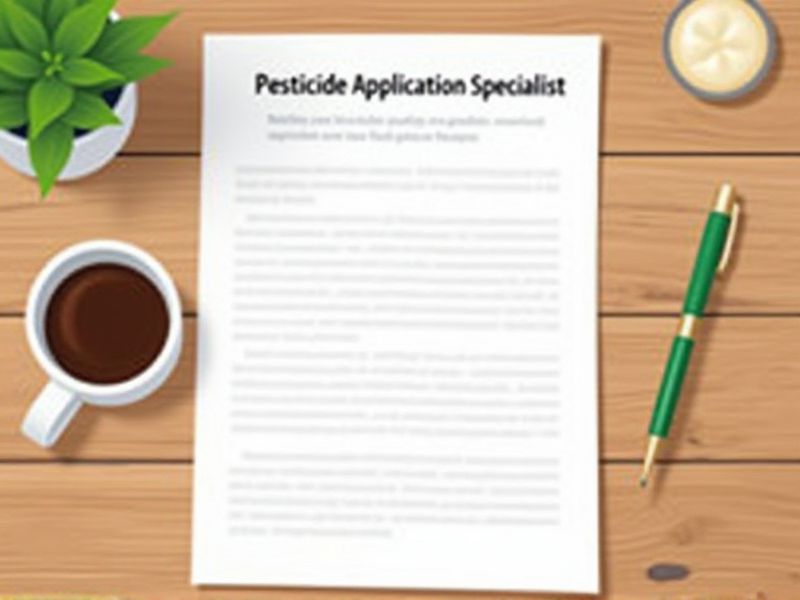
The role of a Pesticide Application Specialist directly impacts public health and environmental safety. Specialized knowledge is required to effectively manage and apply pesticides without causing harm to ecosystems or human health. Certain certifications ensure that specialists are equipped with the necessary skills and legal compliance to perform their duties safely. Key certifications to consider for Pesticide Application Specialists include the following.
State Certified Pesticide Applicator Certification
State Certified Pesticide Applicator Certification is required to ensure that pesticide application specialists possess the necessary knowledge to safely handle and apply pesticides, minimizing harm to the environment and human health. This certification enforces adherence to state and federal regulations, which helps maintain public safety and ecological balance. It also serves to standardize practices across the industry, ensuring professionals are using the most effective and safe techniques. Specialists with certification are more trusted by consumers and employers, which can lead to increased job opportunities and career advancement.
Federal Pesticide Applicator Certification (EPA)
Federal Pesticide Applicator Certification ensures that specialists have the necessary knowledge to safely handle and apply pesticides, reducing the risk of harm to humans and the environment. It standardizes practices across diverse agricultural operations nationwide, promoting consistency and safety. Certification provides a regulatory framework to control and limit pesticide usage, supporting environmental sustainability and public health. It enables specialists to stay informed about evolving regulations and technological advancements in pesticide application.
Restricted-Use Pesticide (RUP) License
The RUP License ensures that pesticide application specialists possess the necessary knowledge and skills to handle potentially hazardous substances safely. It helps in minimizing environmental harm and protects human health by regulating who can apply these potent chemicals. Licensing holds specialists accountable, reducing the incidence of misuse and accidental exposures. Compliance with RUP licensing requirements aligns with legal standards and industry regulations, mitigating legal liabilities for individuals and commercial entities.
Pesticide Safety Education Certification
Obtaining Pesticide Safety Education Certification ensures that Pesticide Application Specialists understand how to safely handle, apply, and dispose of chemical pesticides, minimizing harm to humans and the environment. Proper certification educates specialists about diverse pest control methods and the importance of integrated pest management strategies, leading to better pest control outcomes. The certification process reduces the risk of pesticide resistance development, which can result from inappropriate application practices. Certification enhances compliance with state and federal regulations, avoiding legal consequences and promoting community trust in pest management services.
Integrated Pest Management (IPM) Certification
Integrated Pest Management (IPM) Certification is essential because it ensures that pesticide application specialists use strategies that minimize environmental impact and promote sustainable agriculture. By focusing on IPM principles, specialists are trained to implement pest control methods that are safe for human health and beneficial organisms. Certification ensures adherence to regulatory standards, reducing the risk of improper pesticide use and contamination. Consumers and businesses often demand certified professionals, as it demonstrates a commitment to responsible and effective pest management practices.
Hazard Communication (HazCom) Certification
Pesticide Application Specialists require Hazard Communication (HazCom) Certification to ensure they understand and communicate the risks associated with handling hazardous chemicals. Proper HazCom training helps in recognizing potential dangers and leads to informed decision-making on safety procedures. Pesticide use involves exposure to potentially harmful substances, making the ability to effectively communicate risks crucial for preventing health issues. Certification also ensures compliance with OSHA regulations, reducing legal and financial liabilities for employers.
OSHA 10/30-Hour Certification
Obtaining the OSHA 10/30-Hour Certification for Pesticide Application Specialists reduces workplace accidents by ensuring that individuals understand and adhere to safety protocols. Proper training in safety regulations decreases the risk of hazardous chemical exposure, protecting both workers and the environment. Regulatory compliance is crucial for businesses to avoid penalties and maintain operational licenses, which this certification supports. The certification enhances the credibility of specialists, instilling trust among clients who prioritize safety standards in pest control services.
Certified Crop Adviser (CCA)
Certified Crop Advisers (CCAs) offer expertise in sustainable and effective pesticide application, essential for reducing environmental impact. A CCA ensures compliance with regulations, promoting safety and legal adherence in pesticide use. With their knowledge, they optimize pest management strategies, improving crop yield and quality. Their guidance helps prevent chemical resistance in pests, safeguarding future agricultural productivity.
Environmental Stewardship Certification
Environmental stewardship certification for pesticide application specialists ensures adherence to sustainable practices, reducing negative impacts on ecosystems. It promotes the responsible management and application of pesticides, safeguarding public health and biodiversity. As stricter regulations on chemical use in agriculture evolve, certified specialists enhance their credibility and compliance with industry standards. This certification also drives continuous education, ensuring specialists remain informed on emerging technologies and environmentally-friendly alternatives.
Agricultural Chemical Management Certification
The Agricultural Chemical Management Certification ensures that a Pesticide Application Specialist has the necessary knowledge to handle and apply chemicals safely, thereby reducing the risk of harm to both the environment and human health. Certification mandates training on the proper use, storage, and disposal of pesticides, which directly leads to more efficient and eco-friendly agricultural practices. As misapplication and improper handling of pesticides can result in contamination of water sources and soil, certified specialists are crucial for minimizing these impacts. Earning the certification often correlates with an enhanced understanding of regulations and guidelines, leading to better compliance and avoidance of legal penalties.
Summary
When you become a certified Pesticide Application Specialist, you can expect to enhance your skills and knowledge in safe pesticide handling. Certification often leads to increased job opportunities as it signals expertise and professionalism to employers. This credibility can also result in higher earning potential and career advancement. With the certification, you may contribute to improved environmental and public safety through more effective and responsible pest management practices.
